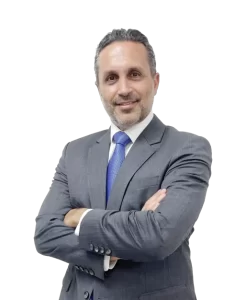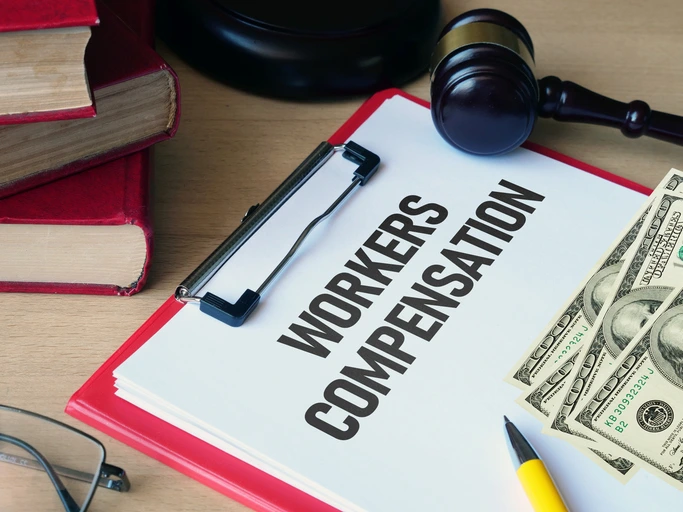Looking for a Workers’ Compensation Lawyer?
 At Barkhordarian Law Firm, we fight for injured workers who need absolute legal protection, not empty promises. When you get hurt on the job, your focus should be on healing—not on battling insurance companies and employers who try to minimize or deny your claim.
At Barkhordarian Law Firm, we fight for injured workers who need absolute legal protection, not empty promises. When you get hurt on the job, your focus should be on healing—not on battling insurance companies and employers who try to minimize or deny your claim.
Unfortunately, filing a workers’ compensation claim can be complicated, and many injured workers face delays, denials, or disputes from employers and insurance providers. That’s where we come in. We are aggressive, honest, and by the book—we don’t cut corners or accept lowball offers. If your employer or insurance company tries to shortchange you, we immediately push back and fight for every dollar you deserve.
Our Culver City workers’ compensation attorneys are dedicated to representing injured workers throughout Los Angeles County, Ventura County, San Bernardino County, Riverside County, and all of California.
Call 888-514-5112 or contact us online now for a free consultation. We don’t get paid unless we win your case.

Get started with a free initial consultation today; call 888-514-5112 or contact us online.
Are All California Employers Required to Carry Workers’ Compensation Insurance?
California law requires nearly all employers to carry workers’ compensation insurance, regardless of size or industry. Unlike some states, which have exemptions for small businesses, California mandates coverage for every employer with one or more employees, including full-time, part-time, and seasonal workers.
That includes:
- Coverage for Undocumented Workers:California law ensures undocumented employees are entitled to workers’ compensation benefits, just like any other worker.
- Independent Contractors:True independent contractors are not covered under workers’ compensation, but misclassification is common. Many workers labeled independent contractors may qualify as employees and be eligible for benefits.
While nearly all employees are covered, some specific exemptions exist:
- Sole Proprietors, unless they have employees.
- Certain Business Owners, such as officers or directors of corporations who own all stock.
- Household Workers, like casual babysitters and some domestic employees.
- Volunteers, unless covered by specific agreements.
What Happens If a California Employer Fails to Carry Workers’ Compensation Insurance?
Failing to provide workers’ compensation insurance is a serious violation of California law, leading to:
- Hefty fines and penalties.
- Criminal charges, including misdemeanor offenses.
- Personal liability for medical expenses and lost wages if an employee is injured.
- Potential business shutdowns ordered by the state.
Employees have the right to verify whether their employer carries workers’ compensation insurance. You can check coverage by:
- Reviewing workplace postings (California law requires employers to display workers’ comp coverage details).
- Asking your employer directly.
- Searching the California Division of Workers’ Compensation(DWC) website.
If you suspect that your employer does not have workers’ compensation insurance, you may still be able to pursue a claim through California’s Uninsured Employers Benefits Trust Fund (UEBTF).
At Barkhordarian Law Firm, we fight for workers injured on the job—even if their employer fails to provide the required coverage. If you have been hurt at work, call (866) 692-8020 or contact us online for a free consultation to discuss your options.
What are the Most Common Types of Work-Related Injuries Covered by Workers’ Compensation in California?
Workplace injuries can range from minor sprains that heal in weeks to catastrophic injuries that cause permanent disability. No matter the severity of your condition, you deserve full compensation for medical care, lost wages, and future expenses. Our attorneys help injured workers navigate California’s complex workers’ compensation system and secure the benefits they are entitled to.
Some common types of work-related injuries that are covered by workers’ compensation include:
- Specific Injuries: Injuries on the job site/due to one-time, single accidents.
- Long-Term Injuries: Injuries that occur slowly over time, usually from repetitive motionsin performing daily routines.
- Stress-Related Injuries/Illnesses: Stress or anxiety caused by the work environment/duties.
- Disease or Illness Due to Various Exposures: Most often, injuries/illnesses caused by chemical exposure at work, including cleaning supplies or working with industrial chemicals.
- Aggravation of a Pre-Existing Injury or Condition: Worsening of various conditions, such as diabetes, hypertension, or even a psychological disorder, due to work injuries/work-related activities.
If you or a loved one suffered any work-related injury or occupational illness, contact our Barkhordarian Law Firm team to learn how our attorneys can help you with your workers’ compensation claim.
What are Workers’ Compensation Benefits in California?
Eligible employees who suffer work-related injuries and illnesses in California are entitled to certain benefits under the state’s workers’ compensation system.
Below, we have provided a brief overview of the various workers’ compensation benefits you may be entitled to receive:
-
- Medical Benefits: Workers’ compensation pays for all “reasonable and necessary” medical care related to your occupational injury or illness. This includes but is not limited to expenses associated with emergency care, ongoing treatment, rehabilitation, copays, medications, and transportation costs to and from medical appointments.
- Temporary Disability: Temporary disability benefits are paid to employees who are temporarily unable to work due to work-related injuries and illnesses. They are typically calculated based on two-thirds the worker’s average weekly wage, subject to state-set weekly maximums.
- Permanent Disability: Workers’ compensation also pays permanent partial disability (PPD) and permanent total disability (PTD) benefits to employees who suffer work-related injuries and illnesses that prevent them from returning to work at full capacity or in any capacity, respectively. Visit our page on permanent disabilityand learn more about these benefits.
- Supplemental Job Displacement: Also known as vocational rehabilitation benefits, supplemental job displacement benefits are available to employees who cannot return to their past employment due to work-related injuries or illnesses. This benefit is only available when the employee’s employer does not offer alternative or light-duty (modified) work.
- Death Benefits: When an employee is killed or dies due to a work-related injury or illness, their surviving spouse, children, and other dependents may be entitled to death benefits through the workers’ compensation system. These include both wage replacement benefits and compensation for funeral/burial expenses.
At the Barkhordarian Law Firm, we are ready to guide you through the necessary procedures to ensure compliance with the applicable California workers’ compensation laws. We will fight for you every step of the way and work to help you achieve the best possible outcome.
We can help you if you have questions about filing your initial claim, have been injured in a construction accident or have suffered a permanent disability, wish to file a third-party work injury claim, have had your claim denied or your benefits terminated, or are dealing with any other workers’ compensation-related issue, dispute, or concern.
We do not charge upfront fees to alleviate the strain of this stressful experience. We will NOT charge you if we do not obtain any settlement. Rest assured, if you are looking for a workers’ compensation attorney in Culver City, the Barkhordarian Law Firm is here to serve you.
Understanding California’s Workers’ Compensation Process
The workers’ compensation claim and appeals processes can be daunting. However, you must take steps to file a claim successfully.
If you are injured or suffer a work-related illness, make sure to do the following:
- Notify Your Employer: It is essential to document your injury in person or in writing immediately. By law, you are required to notify your employer of your injury or illness within 30 days. The 30 days begin either on the date of injury or the date on which the injury/illness was discovered/reasonably could have been found.
- File a Claim: Our skilled attorneys are valuable advocates in filing a claim and will guide you through the process, ensuring everything is accurate. Note that you only have one year from the date of injury/date the injury or illness was discovered or reasonably could have been discovered to file your claim.
- Validate Your Claim: Comply with your insurance carrier or employer to investigate and validate your claim. Much of the “heavy lifting” happens during this phase. If your claim is accepted, you begin receiving monetary and medical benefits.
- Obtain MMI: Undergo a new doctor evaluation once you obtain maximum medical improvement (MMI). You must receive proper evaluation during this step to determine current and future benefits. It is wise to have an advocate rather than rely on your employer’s insurance carrier to make this determination.
- Appeal (If Needed): Appeal your claim if denied.
When you are injured or ill, dealing with the applicable laws to obtain much-needed medical treatment can be overwhelming. This is where we come in. Our lawyers at the Barkhordarian Law Firm fight for your medical care and attention rights. Attaining quality care for your workplace injury or illness is paramount. Early diagnosis and treatment are essential steps on your road to recovery.
At every stage of the process, our California workers’ compensation lawyers are here to provide the answers and information you need. We aim to eliminate your stress and move your claim through the system as efficiently as possible, all while fighting for the maximum benefits you are owed.
What Happens If My California Workers’ Compensation Claim is Denied?
If your California workers’ compensation claim is denied, it does not mean you are out of options. Many legitimate claims are initially denied due to paperwork errors, employer disputes, or insurance companies trying to avoid paying benefits. If this happens, you have the right to appeal the decision and fight for the benefits you deserve.
Your claim may be denied for several reasons, including:
- Your employer or insurer disputes that your injury is work-related.
- You missed the deadline to report the injury or file your claim.
- Your medical records do not support your injury claim.
- Your employer argues that you were intoxicated or engaged in misconduct at the time of the injury.
- The insurance company claims you have a pre-existing condition.
Even if your claim is denied, you still have legal rights and may be able to overturn the decision through appeals.
If you receive a denial letter, follow these steps to protect your claim:
- Review the Denial Letter– The letter should explain why your claim was denied and provide information on how to appeal.
- Speak with a Workers’ Compensation Attorney– An attorney can review your case, gather evidence, and prepare a strong appeal.
- File an Application for Adjudication of Claim– This formally disputes your claim denial and initiates the appeals process with the California Workers’ Compensation Appeals Board (WCAB).
- Request a Mandatory Settlement Conference (MSC)– This is a meeting with the insurance company to resolve the dispute before trial.
- Prepare for a Workers’ Compensation Trial– If no settlement is reached, your case will go before a workers’ compensation judge, who will review the evidence and decide.
- Appeal the Judge’s Decision (If Necessary)– If you disagree with the judge’s ruling, you may be able to file a petition for reconsideration.
Having an experienced California workers’ compensation attorney can significantly improve your chances of success.
Our skilled lawyers can:
- Gather medical evidence to prove your injury is work-related.
- Challenge employer or insurance company disputes.
- Ensure all paperwork is filed correctly and on time.
- Represent you in hearings and negotiations.
- Take your case to trial if needed.
At Barkhordarian Law Firm, we know how to fight insurance companies that wrongfully deny claims. If your workers’ compensation claim has been denied, do not give up—call 888-514-5112 today for a free consultation and let us help you fight for the benefits you deserve.
How the California Workers’ Compensation Attorneys at Barkhordarian Law Firm Can Help
The workers’ compensation system is complicated, and many injured workers are unaware of their full legal rights. At Barkhordarian Law Firm, we aggressively ensure our clients receive the maximum compensation available under California law.
What We Do for Injured Workers:
- Assist with filing claims correctly to avoid unnecessary denials.
- Gather medical and workplace evidence to support your case.
- Negotiate with insurance companies to secure maximum benefits.
- Represent clients in hearings and appeals.
- File lawsuits when necessary to fight for your rights.
A workplace injury can have a devastating impact on you and your family. You are likely worried about your job, money, health, and family obligations. We understand what you are going through. The Barkhordarian Law Firm is dedicated to helping you through this traumatic experience. We serve as your advocate, your guide, and your support. Our workers’ compensation attorneys are committed to maintaining a close relationship with you and ensuring you are kept abreast of everything going on throughout your claim.
Our firm represents injured workers throughout Culver City, Los Angeles County, Ventura County, San Bernardino County, Riverside County, and Southern California.
Call 888-514-5112 now for a free consultation. Let’s fight for the benefits you deserve.
What To Ask a California Workers’ Compensation Attorney
Before hiring a lawyer to help you with your workers’ compensation claim, it’s essential to make sure that you ask your lawyer some questions.
Questions to ask your workers’ compensation attorney include the following:
- What is your success rate?
- How long have you been practicing law?
- What does it cost to hire a workers’ compensation attorney?
- How often will we communicate and how?
- How long will the process take?
- How long do I have to file my workers’ compensation claim?
- What court representation experience do you have?
- Have you represented clients facing injuries similar to mine?
- How will my claim be affected if the accident was my fault?
- How long will it take for me to receive compensation?
- Can I sue my employer?
- When do you suggest that I go back to work?
Choosing the right workers’ compensation attorney is critical in securing the benefits you deserve. You need a lawyer who is experienced, transparent, and committed to fighting for your rights. At Barkhordarian Law Firm, we are ready to answer all your questions and provide straightforward legal guidance tailored to your situation.
Related Links:
- Can I Work and Recover Workers’ Compensation?
- Workers’ Comp vs. Third-Party Liability
- What Is the Requirement for Workers’ Compensation?
Contact us online or call our office at 888-514-5112 to learn how we can assist you during a free initial consultation. Hablamos español.
Frequently Asked Questions (FAQ)
Get Answers From Our California Workers’ Compensation Lawyers
How much time do I have to report my injury?
The injured employee must report the injury to his or her employer within 30 days of the injury unless the employer knew or should have known about the injury. Failure to notify the employer of the injury will not automatically disqualify the injured worker’s case unless the employer can show that they were put at a disadvantage or damaged by the injured employee’s failure to disclose the injury within the first 30 days. The employer has the burden to show prejudice.
How much time do I have to report my injury?
The injured employee must report the injury to his or her employer within 30 days of the injury unless the employer knew or should have known about the injury. Failure to notify the employer of the injury will not automatically disqualify the injured worker’s case unless the employer can show that they were put at a disadvantage or damaged by the injured employee’s failure to disclose the injury within the first 30 days. The employer has the burden to show prejudice.
